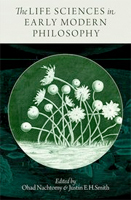Dir. : Ohad Nachtomy (Fordham University and Bar-Ilan University), Justin E. H. Smith (University Paris Diderot, department History and Philosophy of Science, SPHERE)
The contributions to this volume are organized in accordance with the particular problems that living beings and living nature posed for early modern philosophy : the problem of life in general, whether it constitutes something ontologically distinct at all, or whether it can ultimately be exhaustively comprehended "in the same manner as the rest " ; the problem of the structure of living beings, by which we understand not just bare anatomy but also physiological processes such as irritability, motion, digestion, and so on ; the problem of generation, which might be included alongside digestion and other vital processes, were it not for the fact that it presented such an exceptional riddle to philosophers since antiquity, namely, the riddle of coming-into-being out of - apparent or real - non-being ; and, finally, the problem of natural order.’
’– Focuses on a previously largely neglected aspect of the history of early modern philosophy and science.
– Advances a recent historiographical turn towards the intersection of early modern philosophy and the life sciences.
– Contributions are organized in accordance with the particular problems that living beings and living nature posed for early modern philosophy.’
"Justin E. H. Smith is professor in the department of history and philosophy of science at the Université Paris Diderot - Paris 7. He is the author of The Philosopher : A History in Six Types (2016), Nature, Human Nature, and Human Difference : Race in Early Modern Philosophy (2015), and Divine Machines : Leibniz and the Sciences of Life (2011), all from Princeton University Press"
"Ohad Nachtomy is Associate Professor at Bar-Ilan University and at Fordham University. He is the author of Possibility, Agency, and Individuality in Leibniz’s Metaphysics (2007) ; "Leibniz on Nested Individuals"(BJHP 2007) ; "Leibniz and the Logic of Life" (Studia Leibnitiana 2010) ; "Leibniz on Artificial and Natural Machines" in Machines of Nature and Corporeal Substances in Leibniz (co-edited with Justin Smith) (2010) ; and "A Tale Of Two Thinkers, One Meeting, and Three Degrees Of Infinity : Leibniz And Spinoza in 1675-78" (BJHP 2011). "
’These valuable essays will enrich specialists’ understanding of the 17th-century dynamics that produced what has become biology.’ - Choice
’This anthology will be welcomed by philosophers and historians of science.’ - Jeremy Kirby, The Quarterly Review of Biology
’It merits the attention of anyone interested in the philosophical aspects of early modern science.’ - Antonio Clerocuzio, British Journal for the History of Science
: : Oxford University Press
: : Serie : Oxford Philosophical Concepts
: : January 2014
: : 272 Pages
: : ISBN : 9780199987313
SOMMAIRE & CONTRIBUTEURS
1. Introduction : Ohad Nachtomy and Justin E. H. Smith
I. The Nature of Living Beings
2. Ohad Nachtomy, "What’s Infinity Got to Do with Life ? The Role of Infinity in Leibniz’s Theory of Living Beings"
3. Raphaële Andrault, "What Is Life ? A Comparative Study of Ralph Cudworth and Nehemiah Grew"
4. Thomas Teufel, "The Impossibility of a Newton of the Blade of Grass in Kant’s Teleology"
II. The Structure of Living Beings
5. Peter Distelzweig, "Fabricius’ Galeno-Aristotelian Teleomechanics of Muscle Anatomy"
6. Anne-Lise Rey, "Metaphysical Problems in Francis Glisson’s Irritability Theory"
7. François Duchesneau, "’Organism’ in the Leibniz-Stahl Controversy"
III. The Generation of Living Beings
8. Andreas Blank, "Material Causes and Incomplete Entities in Gallego de la Serna’s Theory of Animal Generation"
9. Karen Detlefsen, "Biology and Theology in Malebranche’s Theory of Organic Generation"
10. Catherine Abou-Nemeh, "Réaumur’s Crayfish Experiment in Hartsoeker’s Système : Regeneration and the Limits of Mechanism"
11. Charles T. Wolfe, "Epigenesis as Spinozism in Diderot’s Biological Project"
IV. The Order of the Living World
12. Lea F. Schweitz, "On the Continuity of Nature and the Uniqueness of Human Life in G. W. Leibniz"
13. Brian W. Ogilvie, "Orders of Insects : Insect Species and Metamorphosis between Renaissance and Enlightenment"
Index




